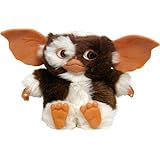Last night Nigel had a Scout meeting. I was a bit apprehensive because the last meeting did not go well, meaning Nigel’s behavior. And because I could not pinpoint what had caused his step backward, I worried that he might continue down that road.
But as I have come to learn, autism is nothing if not unpredictable. Inconsistent. And so I shouldn’t have been surprised when Nigel did really well at the meeting last night. He didn’t interrupt anyone, he only got in someone’s face once, and it was brief, he participated and paid attention. He even requested, appropriately, to show the other Scouts something he had brought with him. He needed to bring it in from the car, and the Scoutmaster said that he could do that near the end of the meeting.
And that’s when I got a little nervous. He wanted to show them a little stuffed animal toy that he had received for his recent fourteenth birthday. It was Gizmo, from the movie Gremlins, and he had barely let it out of his sight since he received it Friday night. He had been sleeping with it every night; he brought it with him to his social skills class on Monday. I knew that someone with an emotional age of eight or nine couldn’t realize that typical twelve- to fifteen-year-olds would not find his little stuffed animal to be nearly as intriguing as he did. I wondered what sort of a response to expect from them.
When the time came, Nigel went out to the car and retrieved Gizmo. He reentered the room with it hidden under his jacket and made a big deal out of keeping it a secret until he was ready to reveal it. Of course the boys were wondering what he had under his jacket. A fascinating geode? A live animal? They kept prompting him to show them, and finally he did. I held my breath.

I needn’t have worried. Once he identified what it was, they all said, “That’s cool, Nigel,” and he took it around the room so all of them could look at it, which they politely did. They did not speak to him in a patronizing manner. They did not roll their eyes or make disparaging remarks. They got it. They realized that this was something important to Nigel, and they were supportive. And I wanted to hug all of them.
So here’s a big shout-out to the Scouts of Troop 535 and their parents: You guys are so great. You make Nigel feel accepted, and he appreciates it, and so do I. Thanks so much for your patience and understanding. It means more than you know.
